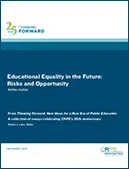This essay examines the implications of a more customized, agile system for the students who have historically lacked full access to learning opportunities. Auditing access to the growing number of out-of-school learning experiences, providing financial support for nonschool educational services, investing in guidance and support to help families navigate a growing number of options, tracking access and success in postsecondary pathways, developing approaches to student success, and addressing preparation gaps all may be necessary to ensure that the most disadvantaged students have equal access to the full range of educational opportunities enjoyed by their more advantaged peers, argues author Ashley Jochim.
“If people who care about public education do not open themselves up to new ways to address inequality, not only will they give up the chance to break through the political deadlock that has characterized school reform fights, but they also are unlikely to make headway in equalizing opportunity for American students,” writes Jochim.
Explore other essays in this collection: Thinking Forward: New Ideas for a New Era of Public Education
Related Posts
- To Meet the Needs of Complex Learners, School Systems Must Think More Boldly, Robin Lake (11/05/2018)
- For Brandon: How One Family’s Struggle Can Help Us Imagine an Education System That Does Better by Exceptional Children, Travis Pillow, 9/5/18
- How Can Public School Students Get the Personalization that Private Schools Offer? by Paul Hill (05/22/18)
- How Can We Get Serious About Successful Pathways for Every Student? by Robin Lake (04/30/18)




